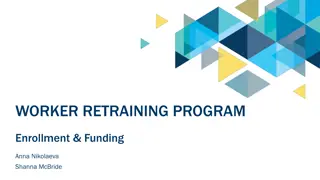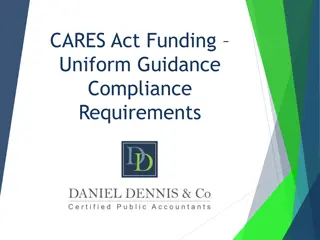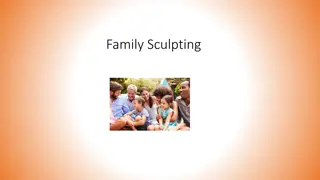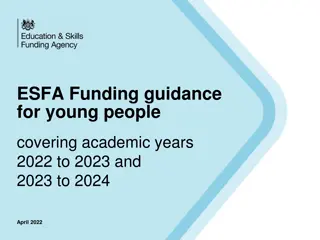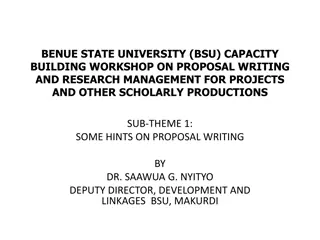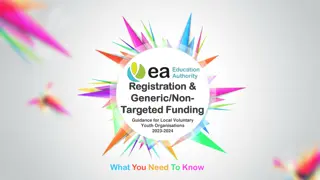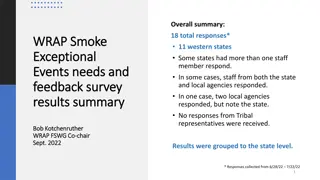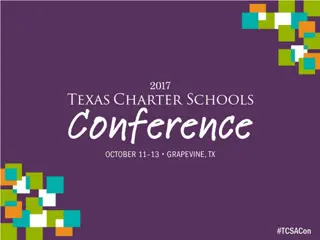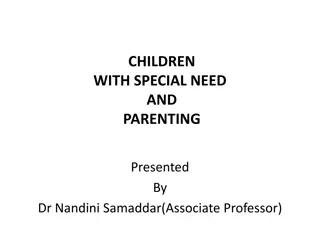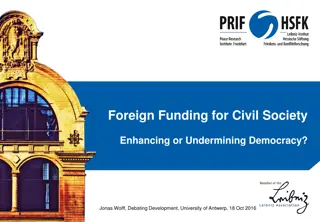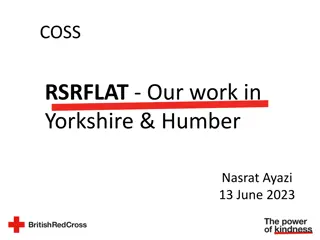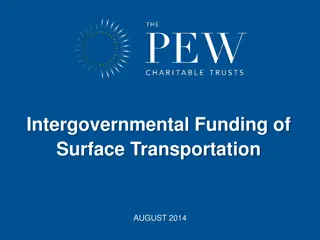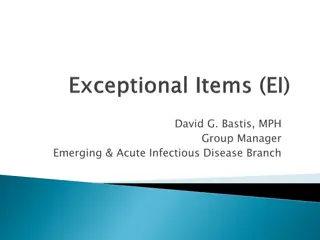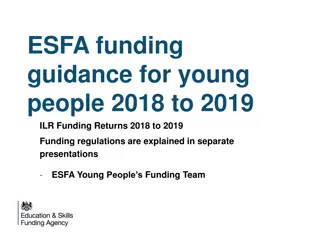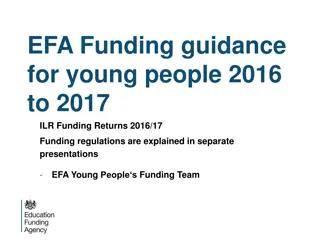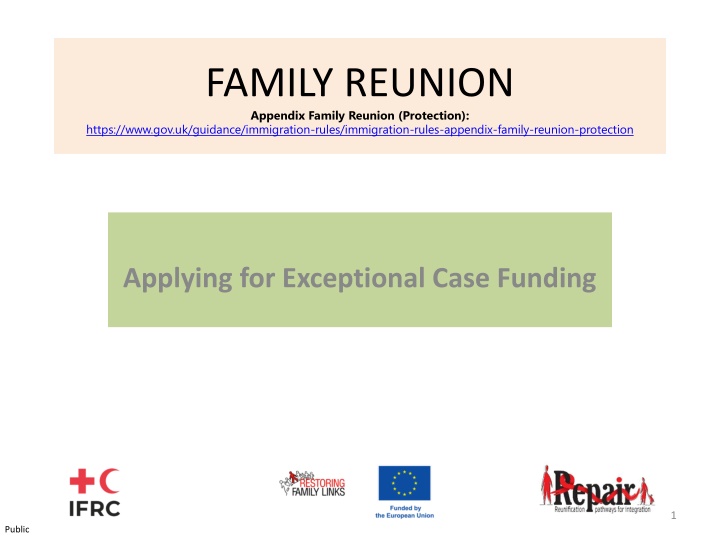
Legal Aid for Family Reunion: Exceptional Case Funding Guide
Learn about obtaining Exceptional Case Funding for family reunion cases where Legal Aid is not typically applicable. Understand the eligibility criteria, application process, and the role of British Red Cross in providing legal advice limited to OISC/IAA Level 2. Assistance is provided to help clients seek funding from the Legal Aid Agency for specialist immigration advice.
Download Presentation

Please find below an Image/Link to download the presentation.
The content on the website is provided AS IS for your information and personal use only. It may not be sold, licensed, or shared on other websites without obtaining consent from the author. If you encounter any issues during the download, it is possible that the publisher has removed the file from their server.
You are allowed to download the files provided on this website for personal or commercial use, subject to the condition that they are used lawfully. All files are the property of their respective owners.
The content on the website is provided AS IS for your information and personal use only. It may not be sold, licensed, or shared on other websites without obtaining consent from the author.
E N D
Presentation Transcript
FAMILY REUNION Appendix Family Reunion (Protection): https://www.gov.uk/guidance/immigration-rules/immigration-rules-appendix-family-reunion-protection Applying for Exceptional Case Funding 1 Public
Did your clients family form a part of his/her family unit before your client fled from their country? YES Have you checked that the all the children who want to join your client are under 18 and they are biological children YES Have you checked that your client s partner s relationship, civil partnership or marriage complies with Rule FRP 4.1 ( for ease of reference listed at the end of this guidance) If your client s family formed part of his/her family before they fled their country, and Yes the children who want to join him/her are not all under 18 and/or are not his/her biological children or it is not possible to prove that your client s relationship with their partner/children is still subsisting the Exceptional Case Funding application is necessary because the case is complex. Public
British Cross Family Reunion Team and limits of Legal Aid in which it operates Family Reunion work does not fall under the scope of Legal Aid following the 2012 Legal Aid, Sentencing and Punishment of Offenders Act (LASPO). However, where a case is complex it may be eligible for Exceptional Case Funding. Some solicitors or organisations (like the British Red Cross) can provide legal advice in family reunion cases limited to OISC/IAA Level 2. This means they cannot help clients who need to prepare an appeal or attend a hearing. Exceptional case funding under s10 of LASPO was designed to provide advice and representation to people whose human rights are breached or at risk; but whose cases are outside the scope of Legal Aid as set out in schedule 1 of the Act. The application that you will help complete will actually be an application by the client to the Legal Aid Agency. Your role is to assist the client to get funding from the Legal Aid Agency and to enable him/her to get advice from a specialist immigration advisor/ lawyer. According to the Legal Aid Agency guidance a member of the public can directly apply for Exceptional Case Funding. This guide will help you when applying for Exceptional Case Funding. Be sure to complete the relevant forms and draft an application asking for funding. 3 Public
Legal Aid and Family Reunion Ordinarily family reunion cases fall outside the scope of Legal Aid and your client who is making an application for family reunion will not be not eligible for Legal Aid for the purpose of making a straightforward Family Reunion application. However, your client may make an application to the Legal Aid Agency for Exceptional Case Funding if withholding of Legal Aid would mean that the applicant is unable to present his/her case effectively and without obvious unfairness. In order for a case to be Exceptionally funded the client must qualify for Legal Aid - this means s/he must be financially eligible for Legal Aid and there needs to be merit in proceeding with the case. 4 Public
Legal Aid Forms required for demonstrating Eligibility for Legal Aid Clients can demonstrate their financial eligibility for Legal Aid by completing forms CW1 or CW2: CW1: CW1: financial eligibility for legal aid clients - GOV.UK CW2: CW2 (IMM) form Clients can demonstrate that the case has merit and meets the necessary merits criteria for Exceptional Case Funding by completing CivECF1 Form: CivECF1: CIFECF1-form.pdf 5 Public
WHICH FORMS TO COMPLETE Your client s family has been refused family reunion and sponsor needs legal aid to get advice about the appeal and/or representation at the hearing Your client s family has not made an application for family reunion or this is a fresh application for family reunion and legal aid is needed Apply for Exceptional Case Funding using forms CIV ECF1 with CW2 (IMM): CIFECF1-form.pdf & CW2 (IMM) form CIFECF1-form. pdf CW2 (IMM) form Apply for Exceptional Case Funding using forms CIVECF1 with CW1: Please also note that ECFs for appeals must be submitted in the applicant s name (the appellant), ECF forms must be completed with the appellant s information & signed by the appellant. CIFECF1-form.pdf CIFECF1-form.pdf CW1 form CW1 form 6 Public
Completing CW1 Form CW1 PAGE 7: If your client is on Income Support, Income-based Jobseeker's Allowance, Income-related Employment and Support Allowance or Guarantee Credit or Universal Credit Tick yes and go to page 8. If your client is not on these benefits complete section on income less monthly allowances- You need to include the Client and Partner s INCOME AND ALLOWANCES if there is a Partner CW1 PAGE 8: If you have evidence of Income and Allowances and Benefits Tick YES for Evidence, If you do not have evidence Give reasons why and when it might be available if it will be available in the future. CW1 PAGE 13: Your client needs to sign and date the Client's Declaration that applies to them (Non means tested matters or means tested matters). They should tick top box confirming they have not received Legal Help for this matter. If your client has a partner they need to sign the Partner s Declaration at page 14.Otherwise leave this blank. CW1 PAGE 15-16: Leave Pages 15 16 blank it does not apply to the Red Cross CW1 PAGE 17: Complete the Evidence Checklist, ticking evidence you have supplied. PLEASE NOTE LEGAL AID AGNCY WILL REQUIRE ORIGINAL LETTER GRANTING UNIVERSAL CREDIT AS EVIDENCE OF BENEFITS NOT MONTHLY STATEMENTS CW1 PAGE 1: Tick Yes to confirm that that this is an application for ECF Funding Completing the Equal Opportunities Monitoring Section is voluntary you don t have to complete Your Client s details must be completed in full CW1 PAGE 2: Matter Type: tick Means Test Required Provider Details This is not applicable Gateway Work- This is also not applicable CW1 PAGE 3: Financial Eligibility; Answer Questions 1 to 4 Note that if the answer to Q 2,3 and 4 is 'no' then you can go directly to page 13. CW1 PAGE 4: Financial Eligibility (cont.); Answer Questions 5 and 6 For Question 7 write Asylum and Immigration Question 8: answer No and go directly to Part B Capital at page 6. CW1 PAGE 6: You need to include the Client and Partner s CAPITAL if there is a Partner. For questions 1-6 many clients answer will be 0 and you will not need to worry about question 6. For question 7 it is possible your client may have savings/ jewellery please check. 7 Public
Completing CW2(IMM) Form CW2 PAGE 1: Tick Yes to confirm that that this is an application for ECF Funding Completing the Equal Opportunities Monitoring Section is optional you don t have to complete it. Your Client s details must be completed in full CW2 PAGE 2: Provider Details This is not applicable to the British Red Cross Financial Eligibility; Answer Questions 1 , IF ANSWER IS YES, SEE NOTE 1 (no means assessment required, skip to case details at page 6 and client's declaration page 13.) Answer Questions 1 , IF ANSWER IS NO, GO TO QUESTION 2 TO CONTINUE TO COMPLETE THE SECTION CW2 PAGE 3-4: For question 2, if your client receives asylum support, go directly to page 5 (Evidence). If not, indicate whether they have a partner. PART A CAPITAL: You need to include the Client and Partner s CAPITAL if there is a Partner For questions 1-5 most clients answer will be 0' For question 6 it is possible your client may have savings/ jewellery please check. For section INCOME PART B If your client is on Income Support, Income- based Jobseeker's Allowance, Income-related Employment and Support Allowance or Guarantee Credit or Universal Credit Tick yes and go to page 5. If not, complete section on income less monthly allowances- You need to include the Client and Partner s INCOME if there is a Partner CW2 PAGE 5: If you have evidence of means Tick YES and LATER COMPLETE PAGE 16 EVIDENCE CHECKLIST If you do not have evidence, give reasons why and when it might be available if it will be available in the future CW2 PAGE 6: QUESTIONS 1-4 ARE NOT APPLICABLE AS REDCROSS IS NOT A PROVIDER CW2 PAGE 7: QUESTIONS 1-8 ARE NOT APPLICABLE AS REDCROSS IS NOT A PROVIDER CW2 PAGE 8: . QUESTIONS 8-12 ARE NOT APPLICABLE AS REDCROSS IS NOT A PROVIDER CW2 PAGE 13: Your client needs to sign and date the Client's DECLARATION CW2 PAGE 14-15: Leave blank it does not apply to the Red Cross CW2 PAGE 16: Complete the Evidence Checklist, ticking evidence you have supplied. PLEASE NOTE LEGAL AID AGENCY WILL REQUIRE ORIGINAL LETTER GRANTING UNIVERSAL CREDIT AS EVIDENCE OF BENEFITS NOT MONTHLY STATEMENTS 8 Public
Completing CW1/CW2 FORMS Useful Information Complete CW1/CW2 form if your client is financially eligible for Legal Aid. To check whether your client is financially eligible for Legal Aid you need to check the following: Check if your client receives any of the passporting benefits. If they do, you only need to means test their disposable capital. If your client doesn t receive a passporting benefit you need to check that their gross income is 2,657 per month or less and then check their disposable income. If your client s gross income is 2,657 per month or less and your client's disposable income is 733 or less then s/he will have passed the income part of the means test for financial eligibility. If your client has passed the income means tests you then need to check their disposable capital (money, investments or property that your client could use or sell to pay for legal help) is no more than 8,000 - or 3,000 if their case is a controlled work immigration matter described in regulation 8(3): if your client passes this test after having passed the income part of the test then s/he will be financially eligible for Legal Aid In most cases, Legal Aid Agency will also take into account the husband/wife or partner s disposable income and capital as well as the client s income. PLEASE NOTE FINANCIAL ELIGIBILITY LIMITS CAN CHANGE .USUALLY THE CHANGE TAKES PLACE IN APRIL. ALWAYS CHECK THE LEGAL AID AGENCY WEBSITE FOR THE LEGAL AID KEY CARD: Legal Aid keycard 49 9 9 Public
What is a Passporting Benefit If your client receives Passporting benefits including: Income Support (IS) income-based Jobseeker s Allowance (JSA) Universal Credit (UC) Guarantee Credit element of Pension Credit (GC) income-related Employment and Support Allowance (ESA) Your client will be passported through the income means test, so they automatically qualify within the income limits but you must still assess their capital. You must assess capital means in all cases. However, if your client receives financial support under sections 4 or 95 of the Immigration and Asylum Act 1999 from the National Asylum Support Service (NASS), they re passported through both income and capital tests for controlled work immigration and asylum matters only. Public
WHAT LEGAL AID AGENCY NEED TO ASK THEMSELVES The overarching question which Legal Aid Agency assessor has to consider is whether the withholding of Legal Aid would mean that the applicant is unable to present his case effectively and without obvious unfairness. What you need to prove is that your client cannot present their case , their case is complex , both the facts and the law are complex, and expecting someone who has limited ability e.g. to speak English or understand legal documents/law, to present their case without support would lead to an obvious unfairness. First present background to your client including chronology of their case from asylum application to grant of refugee status. Explain what is required of the client for the purposes of the family reunion application or appeal, the fact that s/he needs to present evidence, and satisfy the law which is complex. Then go on to explain the personal profile of the client which would mean that your client could not be reasonably expected to present their case. Examples may be: Your client does not have the language skills or expertise to comprehend legal documents/present their case without support from experts . They have used expert help to get this far with their refugee status/ access to housing etc. Your client may not speak English at all or not have enough knowledge of English to understand how to complete any forms, understand the law or provide the evidence that the Law required from them without advice and support. They would not know where to start or how to obtain the evidence required. Your client s background is such that they cannot be expected to be able to complete the family reunion application or understand the law without help- your client may have limited education , have left school early , or worked in a job where their literacy skills were not needed. You can use the fact that your client has received support from Legal experts, counsellors or other organisations to make their asylum applications/benefits applications Your client s medical physical and mental health is such that they would not have the expertise to present their case. It is evident that your client would not have the expertise , knowledge or ability to present their case without support as a result of a combination of their educational background, work history and health and support needs. Public
Preparing a Chronology your clients Case Asylum- Refugee Status To make an application for Exceptional Case Funding you need to go through client records and make a chronology of the facts of the case When did the client arrive in the UK? When did they apply for asylum? Was the asylum application refused and was there an appeal? How did the client manage the appeal? When were they granted refugee status? When does your client's status expire?- Check Biometric Residence Permit Did you client have a lawyer when they applied for asylum? Did your client receive help from someone else other than a lawyer with the application or appeal? Why did they need help, and how much did s/he depend on this help? Was your client granted asylum after their first application or after multiple applications and appeals. This information will need to be summarised and presented in the CivECF1 Form Public
Preparing a profile of your clients language skills, educational background, and work history for completing CIVECF1 Form Does your client speak English fluently? Did your client receive any formal education in their country of origin? What level of education did they receive? What are his/her qualifications What age did s/he leave school? Did they work before coming to the UK? What was their job, and which skills did they need to apply? Has s/he worked since arriving in the UK? What is his/her job in the UK? Can s/he read/write English fluently Can s/he understand legal documents? How has s/he managed to prepare any legal documents in the past? Did s/he receive help and support- who from and when? Does s/he have the confidence and ability to prepare a family reunion application now- eg: complete forms? Does s/he know where to get evidence needed for the application or what evidence is needed? If no- how is s/he expecting to present his/her application? 13 13 Public
Preparing a profile of your clients medical needs for completing CIVECF1 Form Is your client receiving medical help, counselling or other support/ check current medical diagnosis? If yes, get the client to get an up to date letter from the doctor/consultant or other medical professional? Who is providing the support- GP, nurse/ hospital/other expert? What type of support is being provided? How frequently is the support needed?. Confirm whether support from medical and other professionals is ongoing. Ask client to confirm how any condition /or their situation impacts their ability to manage day to day life. How does it impact their ability to comprehend correspondence or respond to correspondence? Check your client s medical history and whether they have had any assistance from medical professionals since their arrival in the UK. Make a chronology of the support received to date? If your client has been seeing support organisations obtain information about which organisations and how your client has been supported. Ask if the organisation can provide a letter to confirm the support received 14 Public
Preparing & Making the case that your clients case is one with Complex Facts e.g. children are aged over 18, or are non biological children or children do not have birth certificates and/or there is no marriage certificate to prove relationship with the family s/he is sponsoring. Explain if the client needs to prove the facts that have been stated and explain how much weight any evidence will carry? e.g. Client will need to prove that the children are his/her, and/ or s/he had a relationship pre flight which has continued post flight. How will your client prove what they are saying? To do this s/he may need to obtain DNA evidence which will definitively prove that the children are his, or may need to obtain documents / get statements to support why children should be with Will the client need expert reports or medical reports? Explain why the evidence and the reports are needed and why not having the reports could lead to assessment or how having the reports would add to their case. Will the client need to commission experts to authenticate documents, present medical evidence? The most obvious is getting DNA evidence or getting documents authenticated. You need to argue be properly advised whether this is necessary. Have these documents been presented before? For cases which have been refused and the client s documents have already been submitted, and say that the client will need to reiterate what the reasons for refusal are and what your client is being asked to prove, and s/he cannot do this without legal advice for reasons which were stated in the previous slide e.g. lack of English/education . This argument could be used for both complexity of facts and the law. What are the important facts in this case for your client ? your client and prove their relationship an unfair that the client should rejected you need to ALWAYS BE CAREFUL WITH THE FACTS THAT YOU STATE IN THE APPLICATION , IF THERE ARE IONCONSISTENCIES WITH PREVIOUS APPLICATIONS OR OTHER FUNDAMENTAL INCONSISTENCIES CLIENT MAY NEED LEGAL ADVICE BEFORE THOSE FACTS ARE STATED IN THE ECF FUNDING APPLICATION. CONSULT YOUR CASEWORK MANAGER 15 Public
Preparing & Making the case that Immigration Law is Complex and an Unfairness will arise if client is unrepresented Once you have proved that the facts of the case are complex . You also need to argue that your client needs to satisfy complex immigration law. Your client needs to prove that the Immigration Rules which s/he needs to satisfy are very complex issues of Article 8 that need to be fully addressed as well as matters of Immigration and asylum law. E.g. The Law on Family Reunion as set out in Appendix Family Reunion (Protection) of the Immigration rules is that children under the age of 18 have an automatic right to family reunion. In your client s case this law does not apply. The children are aged over 18 exceptional circumstances need to be explained, legal advice and support will be needed to put forward to show the exceptional circumstances. The law on Exceptional Circumstances is complicated and gives rise to complex arguments about rights under Article 8 of the European Convention on Human Rights as well other aspects of Immigration and asylum case law. To effectively present his/her case the client will need to have the ability to acquire relevant materials including documentation, legal texts, caselaw and the ability to present how the law applies. In Gudanaviciene and Others v Director of Legal Aid Casework [2014] EWCA Civ 1622 it states at paragraph 171 that: If legal advice is needed, it must be given by a person accredited to OISC Level 2, and there is no evidence that third-sector organisations have the competence and capacity to give such advice on a widespread basis without legal aid. This statement from the Court of Appeal is indicative of the need for high level of legal expertise needed in cases as complex as your client s . 16 Public
Making the case that ECF funding should be granted to avoid a breach of Article 6(1) ECHR Article 6(1) guarantees the right to a fair hearing and the right of access to the court for the purposes of the determination of a person s civil rights and obligations. The Court of Appeal in the case of Gudanaviciene stated that, the critical question is whether an unrepresented litigant is able to present his case effectively and without obvious unfairness . In your client s case ,there is a risk that without representation your client s Article 8 and Article 6(1) rights under the ECHR will not be appropriately safeguarded. Your client requires funding to get representation/ legal advice as the facts and law in your client s case ( give a brief summary) are complex . A grant of funding will enable your client to access much needed legal advice and representation and will avoid a breach of an applicant s rights under Article 6(1) ECHR. State the work that the lawyer will need to do make the application/deal with appeal for Family Reunion by your client s family members who are applying for Entry Clearance to join your client who is a recognised refugee and sponsor for their application. 17 17 Public
Completing the CIVECF1 CIV ECF1 PAGE 1: Explain in the covering note that your client is making this application for Exceptional Case Funding with the support of the Family Reunion team at the Red Cross as she is unable to complete this application without support. For appeals in the covering note add that To represent a family reunion appeal the representative must be a person accredited to OISC Level 3. OISC Level 2 advisers only have the ability to lodge the appeal. They cannot do any substantive work on the appeal Tick if the application is urgent (you will need to give details of this later on). Direct applicants need only complete PART A. CIVECF1 PAGE 2: PART A: provide client's details in full CIVECF1 PAGE 3-4: For Questions 1, 2, 3 and 4 state See attached additional grounds CIVECF1 PAGE 5: This only needs to be completed if you make an urgent application- please consult your casework Manager CIVECF1 PAGE 10: Get your client to sign and date Declaration by Applicant ", leave the rest of the form blank as it only applies to legal providers 18 18 Public
Family Reunion Requirements for leave to enter or remain - APPENDIX FAMILY REUNION (PROTECTION) of the Immigration Rules (cont.) FOR BOTH PARTNERS AND CHILDREN: Validity requirements for Family Reunion FRP 1.1. An application for family reunion must meet the following validity requirements: (a) the applicant s sponsor must currently have protection status or settlement on a protection route in the UK; and (b) the applicant s sponsor must not be a British Citizen; and (c) the applicant must have made an application for: (i) permission to stay under Appendix FRP while in the UK in writing; or (ii) entry clearance when outside the UK through the gov.uk website on either: Partner of someone in the UK with protection status (family reunion) or Child of someone in the UK with protection status (family reunion) ; and (d) the applicant must have provided any required biometric information. FRP 1.2. A family reunion application which does not meet all the validity requirements may be rejected as invalid and not considered. Suitability requirements for Family Reunion FRP 2.1. An application for family reunion must be refused on suitability grounds where the Secretary of State: (a) has at any time decided that paragraph 339AA (exclusion from Refugee Convention), 339AC (danger to the UK), 339D (exclusion from a grant of humanitarian protection) or 339GB (revocation of humanitarian protection on grounds of exclusion) of these rules applies to the applicant; or (b) has decided that paragraph 339AA, 339AC, 339D or 339GB of these rules would apply, but for the fact that the person has not made a protection claim in the UK, or that the person has made a protection claim which was finally determined without reference to any of the relevant matters described in paragraphs 339AA, 339AC, 339D or 339GB. FRP 2.2. The applicant must not fall for refusal under Part 9: grounds for refusal. Identity requirement for Family Reunion FRP 3.1 The applicant must satisfactorily establish their identity and nationality. 19 19 Public
Family Reunion Requirements for leave to enter or remain - APPENDIX FAMILY REUNION (PROTECTION) of the Immigration Rules (cont.) FOR PARTNERS: Relationship requirements for a partner applying for Family Reunion FRP 4.1. The applicant must: (a) be the partner of a person (P) who has protection status; and (b) have formed part of the family unit of P before P left the country of their habitual residence in order to seek protection; and (c) where the applicant is not married or in a civil partnership with P they must also have been living with P for at least 2 years before P left the country of their former habitual residence in order to seek protection; and (d) be in a genuine and subsisting relationship with P; and (e) not be within the prohibited degree of relationship with P which means they could not marry in the UK as set out in Appendix Relationship with Partner. Relationship requirement for a child applying for Family Reunion, Hide FRP 5.1. The applicant must be the child of a person (P) who has protection status or of P s partner. FOR CHILDREN: Family life requirements for a child applying for Family Reunion FRP 6.1. The applicant must: (a) be under the age of 18 at the date of application or, if they are aged 18 or over, the decision maker must be satisfied there are exceptional circumstances (as set out in FRP 6.2.); and (b) have formed part of the family unit of P before P left the country of their habitual residence in order to seek protection; and (c) must meet the independent life requirement for a dependent child in Appendix Children. (d) DELETED. FRP 6.2. Where the applicant is aged 18 or over on the date of application the decision-maker must, when considering whether there are exceptional circumstances, consider all relevant factors including: (a) whether the applicant is dependent on the financial and emotional support of P or P s partner; and (b) whether the parent or parents the applicant depends on is in the UK, or qualifies for family reunion or resettlement and intends to travel to the UK; and (c) whether or not the applicant is leading an independent life, has no other relatives to provide financial or emotional support, and whether they can access support or employment in the country in which they are living and whether they would likely become destitute if left on their own. 20 20 Public
NOTE EXCEPTIONAL CASE FUNDING AT THE RED CROSS Some organisation's ability to provide legal advice in family reunion cases is limited to OISC/IAA Level 2. This means they cannot provide legal advice and assistance to clients who need to prepare an appeal or attend a hearing before a Tribunal or before the Higher Courts. Where the cases are complex you should apply for Exceptional Case Funding. It is important to note that the application for Exceptional Case Funding is being made by the client with your support. Be sure to understand if your organisation has a contract with the Legal Aid Agency for Legal Aid work or if they can be listed a Provider on the Exceptional Case Funding Application. In accordance with the Legal Aid Agency s guidance an individual may apply directly to the Legal Aid Agency for exceptional funding without the need to specify any Provider in the application. . In Gudanaviciene and Others v Director of Legal Aid Casework [2014] EWCA Civ 1622 it states at paragraph 171 that: If legal advice is needed, it must be given by a person accredited to OISC/IAA Level 2, and there is no evidence that third-sector organisations have the competence and capacity to give such advice on a widespread basis without legal aid. To represent a family reunion appeal the representative must be a person accredited to OISC/IAA Level 3. OISC/IAA Level 2 advisers only have the ability to lodge the appeal. They cannot do any substantive work on the appeal 21 21 Public


